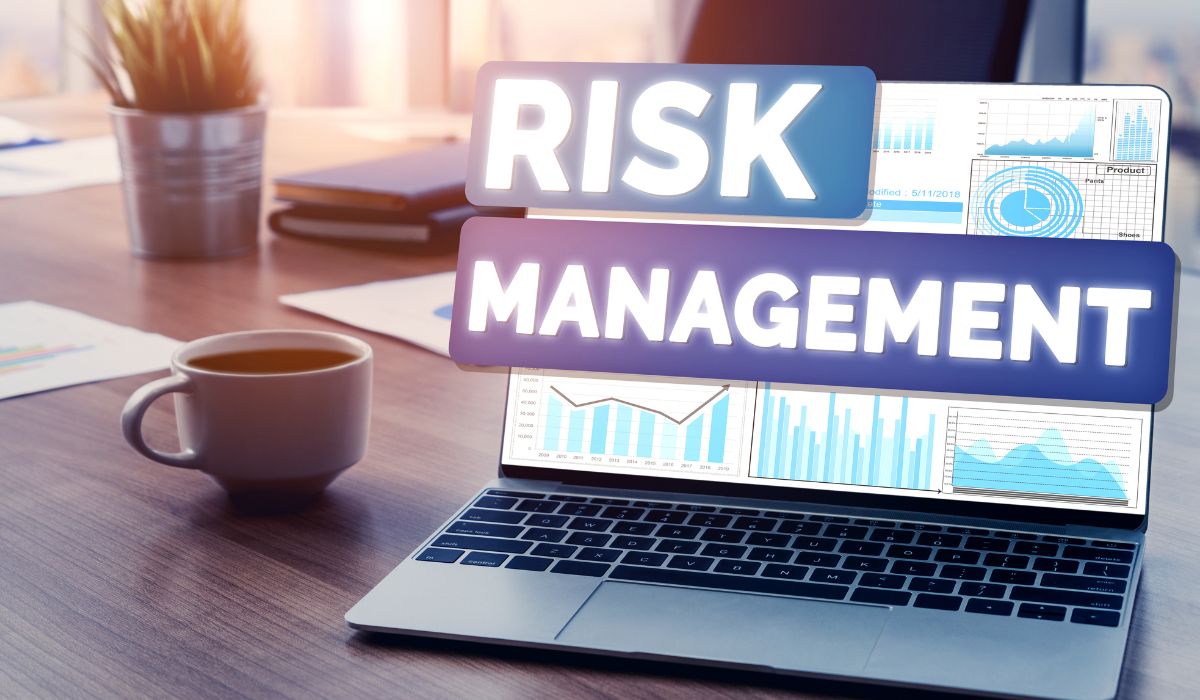Running a successful business comes with its fair share of uncertainties and potential risks. That’s why it’s crucial to have the right strategies in place to protect your hard work and investments.
Here is an overview of some of the essentials of risk management and insurance, along with an explanation of why they are vital for your business’s longevity and success. We’ll explore different types of coverage available, provide tips on choosing the right insurance policies tailored specifically to your needs, and discuss common mistakes that can be avoided along the way.
It is also essential to understand that managing risks goes beyond having insurance coverage. It also involves keeping your finances to mitigate any issues as they happen, and that’s how Protea Financial can help you and your business thrive.
So, let’s dive in together as we uncover the world of risk management and insurance for businesses like yours. Ready? Let’s go!
Understanding Risk Management and Insurance
Risk management is the process of identifying, assessing, and mitigating potential risks that may impact your business. It involves analyzing various factors such as financial, operational, legal, and strategic risks to develop strategies for minimizing their impact.
Insurance, on the other hand, provides financial protection against these risks by transferring them to an insurance company in exchange for premium payments. It acts as a safety net that can help cover costs associated with property damage, liability claims, employee injuries or illnesses, and more.
Understanding risk management and insurance principles, you can better protect your business from unexpected events leading to significant financial losses or even closure. Assessing potential risks allows you to take proactive measures to mitigate them before they occur.
Effective risk management involves conducting regular risk assessments within your organization. This includes identifying internal and external risks for your industry or business operations. Once identified, you can prioritize these risks based on their severity and likelihood of occurrence.
The Importance of Risk Management for Your Business
Risk management is a crucial aspect of running a successful business. It involves identifying potential risks impacting your operations and taking proactive steps to mitigate them. By implementing effective risk management strategies, you can protect your business from financial losses, reputational damage, and other negative consequences.
- One of the critical reasons why risk management is important for your business is that it helps you identify and prioritize potential threats. This allows you to allocate resources effectively and implement measures to reduce or eliminate those risks. By addressing risks before they become major issues, you can save both time and money in the long run.
- Another reason why risk management is essential is that it helps maintain continuity in your business operations. Unexpected events such as natural disasters or cybersecurity breaches can disrupt normal workflows and cause significant disruptions. With proper risk management protocols in place, you can minimize the impact of these events on your business by having contingency plans ready.
- Effective risk management also enhances stakeholder confidence in your business. When investors, employees, customers, and partners see that you have robust strategies in place to manage risks effectively, they are more likely to trust in the stability of your organization. This can lead to improved relationships with stakeholders and increased opportunities for growth.
- Furthermore, incorporating risk management into your overall business strategy enables better decision-making at all organizational levels. It encourages a culture of accountability where employees are aware of their roles in managing risks associated with their work responsibilities.
Integrating effective risk management practices into every aspect of your business is vital for its long-term success. Don’t underestimate the importance of mitigating potential threats – invest time and effort into understanding different types of risks specific to your industry and take appropriate actions accordingly!

Different Types of Business Insurance Coverage
Having the right insurance coverage is crucial for protecting your business. There are various types of insurance policies designed specifically for businesses, each serving a different purpose and providing coverage for specific risks.
- One common type of business insurance is general liability insurance. This policy protects your business against claims related to bodily injury or property damage caused by your products, services, or operations. It also covers legal expenses in case you’re sued.
- Another necessary type of coverage is property insurance. This policy helps protect your physical assets, such as buildings, equipment, inventory, and furniture, from damage or loss due to fire, theft, vandalism, or natural disasters.
- If your business relies heavily on technology and data storage, consider getting cyber liability insurance. This coverage can help protect against losses from hacking attacks or data breaches that could lead to financial loss or reputational damage.
- Professional liability insurance is essential for businesses that offer professional services such as consulting or accounting. It protects in case a client alleges negligence or errors in the services provided by your business.
- Workers’ compensation insurance is mandatory in most states and covers medical expenses and lost wages if an employee gets injured while working for you.
- Business interruption insurance can be a lifesaver when unforeseen events disrupt normal operations. It compensates for lost income during the period when you’re unable to operate due to covered perils like fire or natural disasters.
- Product liability insurance offers protection if someone suffers harm from using one of your products. It covers legal fees and settlements related to product defects causing injuries.
Understanding the different types of business insurance coverage available will help you make informed decisions about which policies are necessary based on the nature of your business and its unique risks. Remember that every industry may have additional specialized coverage tailored specifically to their needs!
How to Choose the Right Insurance for Your Business
When choosing the right insurance for your business, you need to consider several factors.
- First and foremost, assess your specific needs and risks. What type of industry are you in? What are the potential hazards or liabilities that your business may face? By understanding these factors, you can narrow down the types of insurance coverage that would be most beneficial.
- Next, research different insurance providers and compare their offerings. Look into their reputation, customer reviews, and financial stability. It’s important to choose an insurer that not only provides comprehensive coverage but also has a track record of excellent service.
- Consider working with an experienced insurance broker or agent specializing in commercial policies. They can help guide you through the process and provide valuable insights based on their expertise.
- Evaluate the cost versus benefit ratio. While it’s tempting to go for the cheapest option available, make sure that the coverage provided meets your needs adequately. Balance affordability with sufficient protection.
Review each policy carefully before making a decision. Understand what is covered under each plan and any limitations or exclusions that may apply. Regularly reassess your insurance needs as your business evolves over time. As your operations expand or change direction, ensure that your coverage remains relevant and adequate.
Tips for Managing Risk in Your Business
When managing risk in your business, several tips can help you navigate the challenges and uncertainties that may arise.
- Assessment: First and foremost, it’s crucial to identify and assess potential risks specific to your industry and operations. This could include anything from natural disasters or cyber threats to employee injuries or supply chain disruptions.
- Plan: Once you have identified these risks, the next step is to develop a comprehensive risk management plan. This should outline strategies for preventing or minimizing these risks, as well as steps to take in the event of an incident. It’s crucial to review and update this plan regularly as your business evolves.
- Communicate: Communication is key when it comes to managing risk effectively. Ensure that all employees know potential risks and their roles in mitigating them. Regular training sessions help keep everyone informed and prepared.
- Verify: You want to take the time to verify that all documentation for your business is accurate as well when trying to mitigate or minimize risks. This ranges from ensuring your financials are always to knowing where every cent of money comes in and goes for your business. These verifications not only help you make accurate decisions but also reduce the risks of problems like fraud, missed expenses, or unnecessary purchases.
- Updating: Regularly reviewing and updating insurance coverage is another essential aspect of risk management. Make sure that your policies adequately cover potential risks specific to your business.
By implementing these tips for managing risk in your business, you’ll be better equipped to protect yourself against unforeseen events that could potentially harm your operations or bottom line!

Common Mistakes to Avoid in Risk Management and Insurance
When it comes to risk management and insurance for your business, there are some common mistakes that you should avoid. These mistakes can have serious consequences and may leave your business vulnerable to financial loss or legal issues.
- One common mistake is not adequately assessing the risks that your business faces. It’s important to evaluate all potential risks thoroughly and determine the likelihood of their occurrence. This will help you prioritize which risks need to be addressed first.
- Another mistake is underestimating the importance of having appropriate insurance coverage. Many businesses must avoid assuming they don’t need certain types of insurance or skimping on coverage to save money. However, this can leave you exposed in case of a disaster or lawsuit.
- Additionally, failing to review and update your insurance policies regularly is another common mistake. Your business needs may change over time, so it’s crucial to ensure that your coverage aligns with your current situation. Periodically reviewing your policies will help you identify gaps in coverage and make necessary adjustments.
- Not understanding the terms and conditions of your insurance policies is also a critical error. It’s essential to read all policy documents carefully, including any exclusions or limitations, before signing up for coverage. Failing to do so could result in surprises when it comes time to file a claim.
- Relying solely on insurance without implementing proper risk mitigation strategies is another common misstep. Insurance should be considered part of an overall risk management plan rather than a standalone solution. Implementing measures such as employee training programs or safety protocols can reduce the likelihood and impact of certain risks.
By avoiding these common mistakes in risk management and insurance, you can better protect yourself against unforeseen events and secure the future success of your business.
Protecting Your Business with Proper Risk Management and Insurance
In today’s fast-paced and unpredictable business landscape, every entrepreneur needs to prioritize risk management and insurance. By doing so, you can safeguard your business from unforeseen circumstances that could potentially jeopardize its survival.
Choosing the right insurance coverage for your business can be overwhelming but critical. Here are some factors to consider:
- Assess Your Risks: Identify the specific risks associated with your industry and operations. This will help you understand what type of coverage you need.
- Research Insurance Providers: Look for reputable insurers specializing in coverage for similar businesses. Read reviews and compare quotes from multiple providers before making a decision.
- Consult with Experts: Seek advice from experienced professionals like financial advisors or consultants who can guide you through selecting suitable coverage options based on your unique needs.
- Review Policy Terms Carefully: Pay close attention to policy exclusions, deductibles, limits of liability, terms of payment, cancellation policies, etc., before signing any contracts.
Once you have secured appropriate coverage for your business through comprehensive risk management practices:
- Regularly Review Policies: As your business evolves over time or expands into new areas or markets, ensure that your policies adequately reflect these changes—update them accordingly if necessary.
- Maintain Good Record-Keeping: Keep organized documentation of your finances, as well as your insurance policies, claims, and any changes made.
- Train Employees on Risk Management: Educate your employees on risk management practices and how to prevent potential risks from occurring. This can help reduce the likelihood of accidents or incidents resulting in claims.
- Conduct Regular Risk Assessments: Continuously assess your business operations to identify new risks and make necessary adjustments to your risk management strategies and insurance coverage.
- Have a Crisis Management Plan in Place: In case of a crisis or unexpected event, have a plan to minimize damage and disruption to your business operations. This should include emergency contact information for key personnel, backup plans for essential systems, and protocols for communication with stakeholders.
Proper risk management and insurance are crucial for protecting your business from financial losses due to unforeseen events. By implementing comprehensive risk management practices and securing adequate coverage, you can safeguard your business’s future and ensure its long-term success.
Contact Protea Financial for Help Mitigating Risks When It Comes to Your Finances
If you want help making sure that your finances are in order, then reach out to us. Contact Protea Financial and let our team guide your business toward success by making sure you have every financial statement in order and accurate.
Disclaimer: Protea Financial is not a financial advisement firm. For advice, consider seeking guidance from a financial advisor specializing in risk management for businesses like yours. They can provide valuable insights into identifying, assessing, and managing risks effectively.
Frequently Asked Questions
What is risk management in business?
Risk management is the process of identifying, assessing, and mitigating potential threats to your business. It helps minimize financial losses, legal liabilities, and operational disruptions, ensuring smoother business operations.
Why is business insurance important?
Business insurance protects against unexpected events like property damage, liability claims, and employee injuries. It helps businesses recover financially from potential losses.
What types of business insurance are available?
Common types include general liability, property insurance, workers’ compensation, and cyber liability. Each covers specific risks, protecting your assets and operations.
How do I choose the right insurance for my business?
Assess your business risks, research providers, compare coverage options, and consult experts. Balance cost with the level of protection required.
What are the benefits of risk management for businesses?
Risk management reduces financial losses, protects your reputation, and helps maintain business continuity by mitigating potential threats before they escalate.
What is general liability insurance?
General liability insurance covers claims related to bodily injury, property damage, and legal fees if someone sues your business for damages.
How can I reduce risks in my business?
Regularly assess risks, develop mitigation strategies, train employees, and update insurance coverage to align with your business needs.
Why is cyber liability insurance important?
Cyber liability insurance protects your business from financial losses caused by data breaches, hacking, or cyberattacks, which can lead to reputational damage.
What is workers’ compensation insurance?
Workers’ compensation covers medical expenses and lost wages for employees injured on the job, providing financial security for both the business and workers.
How does business interruption insurance help?
It compensates for lost income when your business can’t operate due to events like fires or natural disasters, ensuring you recover financially.



